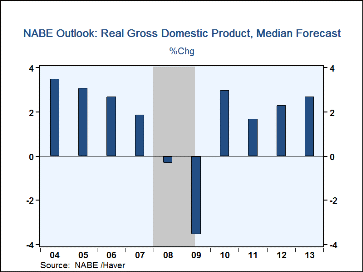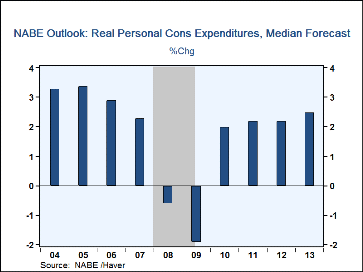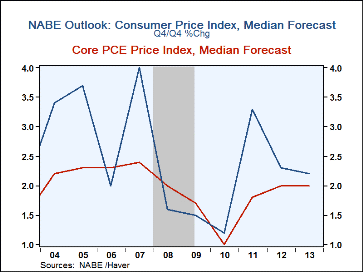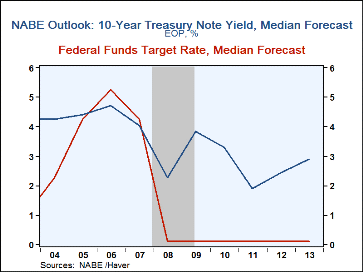 Global| May 21 2012
Global| May 21 2012NABE Forecast For Moderate Economic Improvement & Low Inflation Is Little-Changed
by:Tom Moeller
|in:Economy in Brief
Summary
For 2013, the National Association for Business Economics expects real GDP growth of 2.7% versus 2.8% forecast in February. That follows expected 2.3% growth in this year, little changed from 2.4% forecasted earlier. Expectations for [...]
For 2013, the National Association for Business Economics expects real GDP growth of 2.7% versus 2.8% forecast in February. That follows expected 2.3% growth in this year, little changed from 2.4% forecasted earlier. Expectations for growth in various sectors continue to show improvement. Consumer spending next year is expected to rise 2.5%, a slight pickup from this year. Growth in business fixed investment should power along at a comparatively strong 7.3% rate. That growth is down, however, from double-digits early in the recovery. Residential investment is expected to improve in 2013 from its moderate gain this year.
Expectations call for 850,000 housing starts in 2013, after an upwardly revised 720,000 for this year. Expected light vehicle sales show further improvement to 14.8M after a raised 2012 expectation for 14.5M. Forecasted monthly gains in payroll employment of 200,000 also were raised after upwardly revised 2012 expected gains of 188,000. The unemployment rate is expected to fall faster and average 7.7% for all of next year. The forecast for consumer price inflation remains low at 2.3% versus 2.4% for 2012. However, expectations for prices less food & energy are expected to remain elevated at 2.0% growth for this year and next. Crude oil prices should average $105 at yearend 2013 versus $104 at the end of this year.
Recent improvement in the bond market is expected to end with firmer economic growth. The interest rate on 10-year Treasury notes by the end of next year should rise 100 basis points from now compared to steady short-term rates. Better economic growth is projected to generate improved corporate profitability. The forecast for 6.3% profits growth in 2013 is up slightly from a downwardly revised 5.0% this year. However, these rates remain well below the 19.0% gain in 2010 and 12.6% growth in 2009 when the recovery first got going. Moderate economic growth is forecast to reduce the federal government budget deficit to $900 billion in 2013 versus its $1.4 trillion 2009 peak.
The figures from the latest NABE report can be found in Haver's SURVEYS database.
| National Association For Business Economics | 2013 | 2012 | 2011 | 2010 | 2009 |
|---|---|---|---|---|---|
| Real GDP (% Chg. SAAR) | 2.7 | 2.3 | 1.7 | 3.0 | -3.5 |
| Personal Consumption Expenditures | 2.5 | 2.2 | 2.2 | 2.0 | -1.9 |
| Nonresidential Structures | 5.5 | 2.9 | 4.6 | -15.8 | -21.2 |
| Producers' Durable Equipment & Software | 7.3 | 7.8 | 10.4 | 14.6 | -16.0 |
| Residential Investment | 10.4 | 8.8 | -1.3 | -4.3 | -22.2 |
| Change in Real Business Inventories (Bil. $) | 49.0 | 52.7 | 35.6 | 58.8 | -144.9 |
| Real Net Exports (Bil. $) | -400.7 | -415.0 | -413.6 | -421.8 | -358.8 |
| Housing Starts (Mil. Units) | 0.85 | 0.72 | 0.61 | 0.59 | 0.55 |
| Light Vehicle Sales (Mil. Units) | 14.8 | 14.5 | 12.7 | 11.6 | 10.4 |
| Payroll Employment Avg. Monthly Change (000s) | 200 | 188 | 153 | 86 | -422 |
| Unemployment Rate (%) | 7.7 | 8.1 | 9.0 | 9.6 | 9.3 |
| Consumer Price Index (Y/Y %) | 2.3 | 2.4 | 3.1 | 1.6 | -0.3 |
| Fed Funds Rate (%, Year End) | 0.125 | 0.125 | 0.125 | 0.125 | 0.125 |
| 10-Year Treasury Note (%, Year End) | 2.89 | 2.44 | 1.89 | 3.30 | 3.85 |
Tom Moeller
AuthorMore in Author Profile »Prior to joining Haver Analytics in 2000, Mr. Moeller worked as the Economist at Chancellor Capital Management from 1985 to 1999. There, he developed comprehensive economic forecasts and interpreted economic data for equity and fixed income portfolio managers. Also at Chancellor, Mr. Moeller worked as an equity analyst and was responsible for researching and rating companies in the economically sensitive automobile and housing industries for investment in Chancellor’s equity portfolio. Prior to joining Chancellor, Mr. Moeller was an Economist at Citibank from 1979 to 1984. He also analyzed pricing behavior in the metals industry for the Council on Wage and Price Stability in Washington, D.C. In 1999, Mr. Moeller received the award for most accurate forecast from the Forecasters' Club of New York. From 1990 to 1992 he was President of the New York Association for Business Economists. Mr. Moeller earned an M.B.A. in Finance from Fordham University, where he graduated in 1987. He holds a Bachelor of Arts in Economics from George Washington University.
More Economy in Brief
 Global| Feb 05 2026
Global| Feb 05 2026Charts of the Week: Balanced Policy, Resilient Data and AI Narratives
by:Andrew Cates










